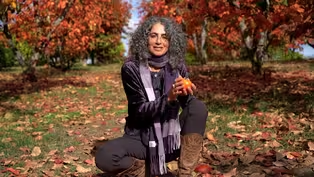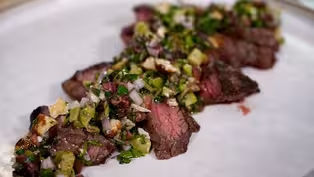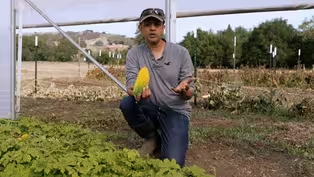
Twin Peaks Orchards
Clip: 8/30/2024 | 5m 41sVideo has Closed Captions
Visit a persimmon farm owned by a family that’s been growing this golden fruit for a century.
When the leaves turn color and the air grows crisp, it’s time for this fall crop: Persimmons! Meet a farm family that’s been growing this golden fruit for more than a century, and see how they overcame a devastating fire during peak harvest.
Problems playing video? | Closed Captioning Feedback
Problems playing video? | Closed Captioning Feedback
America's Heartland is presented by your local public television station.
Funding for America’s Heartland is provided by US Soy, Sustainable Agriculture Research and Education, Rural Development Partners, and a Specialty Crop Grant from the California Department of Food and Agriculture.

Twin Peaks Orchards
Clip: 8/30/2024 | 5m 41sVideo has Closed Captions
When the leaves turn color and the air grows crisp, it’s time for this fall crop: Persimmons! Meet a farm family that’s been growing this golden fruit for more than a century, and see how they overcame a devastating fire during peak harvest.
Problems playing video? | Closed Captioning Feedback
How to Watch America's Heartland
America's Heartland is available to stream on pbs.org and the free PBS App, available on iPhone, Apple TV, Android TV, Android smartphones, Amazon Fire TV, Amazon Fire Tablet, Roku, Samsung Smart TV, and Vizio.
Providing Support for PBS.org
Learn Moreabout PBS online sponsorship(gentle music) - This is my home, this is Twin Peaks Orchards.
We are an 80 acre orchard located in the foothills of Placer County.
So we're in Newcastle and we've been here since 1912.
- [Narrator] The colors of fall leaves and fruit paint these rolling hills with crimson and gold.
Camelia Enriquez Miller is the fourth generation to farm this sun kissed land, made sweeter with the help of her husband, Justin Miller, working side by side every day of the year.
The Millers grow dozens of varieties of fruit trees, filling the air with the smell of handpicked peaches and plums, nectarines, and citrus alongside their best seller, persimmons.
Camelia's great grandparents first farmed this land, planting their family roots and persimmons more than a century ago.
- When they came over from Japan, when my great-grandfather and grandmother came over from Japan, they came to scout the land out first.
My grandfather went back to Japan and brought back things that he wanted to grow, one of 'em being persimmons.
So we grow four varieties of persimmons and we grow one variety in particular that's very special to our farm called an Amagaki.
That's a name that my grandfather gave this persimmon to differentiate between all the other persimmons out in the market.
Some of the persimmon trees that we have on the property are from that original planting.
- [Narrator] Generation after generation has been perfecting persimmons, the life source for the family farm since day one.
With roots that run so deep, they would one day save their sacred space.
You cannot buy an Amagaki persimmon tree.
It was created here through many years of experimentation and cross-breeding.
- There are going to be some older Japanese farmers that are familiar with that process and there's a couple other farms that do a similar process.
There's only two that I know of, one in Spain and one in India.
- [Narrator] The Amagakis are picked and shipped within 48 hours.
At the peak of harvest, more than a ton of persimmons are packed in and out each day.
- How much does a tree produce?
- That's a good question, it depends on the age of the tree, the size of the tree, how the tree's been maintained.
But we can usually get about 400 pounds off of a mature persimmon tree.
- Geez.
- 400 pounds and if we have a couple thousand trees, that's a lot of fruit.
- These Hachiya persimmons are being transformed into cookies and pies from a member of the third generation of this farm.
Tell me about Carol.
- Carol is third generation, she grew up here on the farm.
She probably has the most farm knowledge and she's in here.
- Come on in.
- Making goodies in the kitchen.
This is what she does.
- Good to see you.
- Good to see you.
I see you all the time.
- Well, it's nice to see you in person.
- Yes.
- And what are you doing?
- [Narrator] Carol's food is phenomenal, but her favorite place, the sweet spot of her family's farm, is the memorial to her ancestors.
- There's a certain thing that you've gotta have.
My grandmother taught me, my dad taught me.
And there's a certain thing that you gotta have in your soul that says get off your butt and work.
- Camelia bought Twin Peaks Orchards from her parents in August of 2020.
One month later, she almost lost it all.
During the height of the COVID pandemic and the 100 degree scorching summer heat, the centerpiece of the family farm, their beloved historic barn burned to the ground.
It was a total loss destroying the processing plant, cold storage, and all of the farming equipment.
- This was the time when we were going out with like a bang, right?
I mean this is the big harvest before the end of the season.
So we were full of fruit, we had customer commitments, we had a full staff.
The fire happens, we don't know what we're gonna do.
If we didn't continue, the fruit's still gonna ripen.
There's still fruit that needs to be harvested.
- [Narrator] And guess what fruit?
The Amagaki, ripe and ready to harvest.
The trees that have stood the test of time would save Camelia's treasured Twin Peaks.
- The community really pulled together to get us through that summer harvest because without that persimmon crop, without this Amagaki crop, our farm would be done.
(upbeat music) - [Narrator] Today, Twin Peaks Orchards is thriving, even becoming 100% certified organic.
Camelia leads the way with her husband, Justin, Aunt Carol, and a dedicated team by her side.
She wouldn't have it any other way.
- I want something to hand down.
I want this to be my legacy too.
Persimmons - Harvesting Health
Video has Closed Captions
Clip: 8/30/2024 | 3m 43s | Our health expert unpacks all the nutritional benefits of persimmons. (3m 43s)
Seared Skirt Steak by Farm to Fork
Video has Closed Captions
Clip: 8/30/2024 | 5m 24s | Discover how to cook a perfectly seared skirt steak with an olive tapenade. (5m 24s)
Video has Closed Captions
Clip: 8/30/2024 | 4m 30s | See why it takes a lot of trial and error to start a small farm in California these days. (4m 30s)
Providing Support for PBS.org
Learn Moreabout PBS online sponsorship

- Food
Christopher Kimball’s Milk Street Television
Transform home cooking with the editors of Christopher Kimball’s Milk Street Magazine.












Support for PBS provided by:
America's Heartland is presented by your local public television station.
Funding for America’s Heartland is provided by US Soy, Sustainable Agriculture Research and Education, Rural Development Partners, and a Specialty Crop Grant from the California Department of Food and Agriculture.



